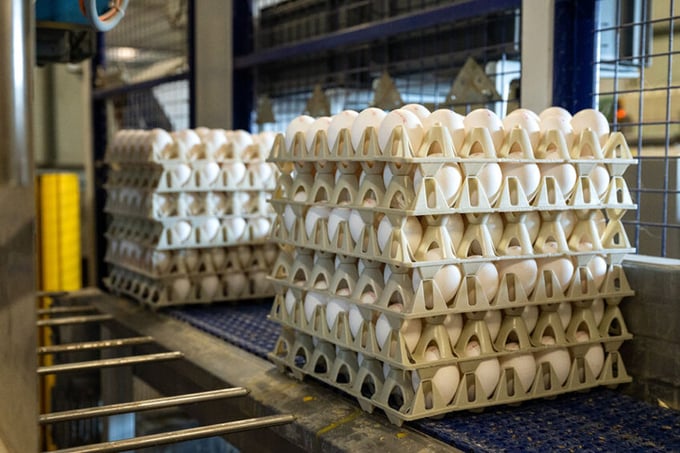November 20, 2025 | 10:41 GMT +7
November 20, 2025 | 10:41 GMT +7
Hotline: 0913.378.918
November 20, 2025 | 10:41 GMT +7
Hotline: 0913.378.918

Egg producers in California, or those wanting to sell eggs into the state, must comply with Prop 12, which, since January 2022, states that for laying hens, no cages are permitted. Photo: Cor Salverius Photography.
This legislation, fully implemented in January 2022, outlines standards for confinement systems for laying hens, sows and veal calves in California. For laying hens, no cages are permitted.
However, Prop 12 also prohibits any business from knowingly engaging in the sale within the state of California of shell/liquid eggs, pork and veal derived from birds, pigs or veal calves housed in a “cruel” manner contrary to Prop 12 housing standards. This means egg producers wanting to sell eggs into California must comply with Prop 12.
The state of California has the largest population (almost 40 million people) of any state. It’s hard to determine how many eggs are produced in the state or shipped in from other states. TheAssociation of California Egg Farmers had strongly opposed the timeline for implementation of Prop 12 on its website, but no contact information was given for further inquiry. And now, the association seems to have dissolved.
Tyson Foods and Hormel Foods, which are 2 of the largest US poultry companies, have agreed to comply with Prop 12 – the latter, as far back as October 2020.
In July 2021, the United Egg Association’s (UEA) Further Processors Division, which represents firms that process eggs into food products, sent a letter to the California Department of Food and Agriculture asking for clarifications related to Prop 12, but stated: “Our members are committed to complying with the regulations.”
The decision of the US Supreme Court to uphold Prop 12 was close: 5-4. However, one of the dissenting judges, Chief Justice Kavanaugh, noted that the Court’s decision could be challenged in the future.
He stated in his opinion, which accompanies the Court’s decision, that although the Court “rejects the plaintiffs’ dormant Commerce Clause challenge as insufficiently pled, state laws like Proposition 12 implicate not only the Commerce Clause, but also potentially several other constitutional provisions, including the Import-Export Clause, the Privileges and Immunities Clause, and the Full Faith and Credit Clause.”
He added: “In other words, if one State conditions the sale of a good on the use of preferred farming, manufacturing, or production practices in another State where the good was grown or made, serious questions may arise under the Import-Export Clause. I do not take a position here on whether such an argument ultimately would prevail. I note only that the question warrants additional consideration in a future case.”
(PW)

(VAN) Flagship partnership secures additional GBP 16.9 million to strengthen forest monitoring, transparency and country support to 2030.

(VAN) After a turbulent year for international development, the aid and assistance landscape has shifted, with donors rethinking how, where and why they support sustainable development.

(VAN) A new tool for measuring the economic value of farm animal welfare improvements has been developed, potentially transforming how consumers, retailers and the government evaluate animal welfare policies.

(VAN) The Amazon rainforest could face a renewed surge of deforestation as efforts grow to overturn a long-standing ban that has protected it.

(VAN) Conflict and violence are driving extreme hunger in six major crises.

(VAN) European Union member states are seeking to postpone the implementation of the bloc's anti-deforestation law by another year, an EU negotiating draft dated November 10 shows.

(VAN) Nearly 30 new avian influenza outbreaks have recently been reported in Germany, both on commercial poultry farms and in backyard flocks.